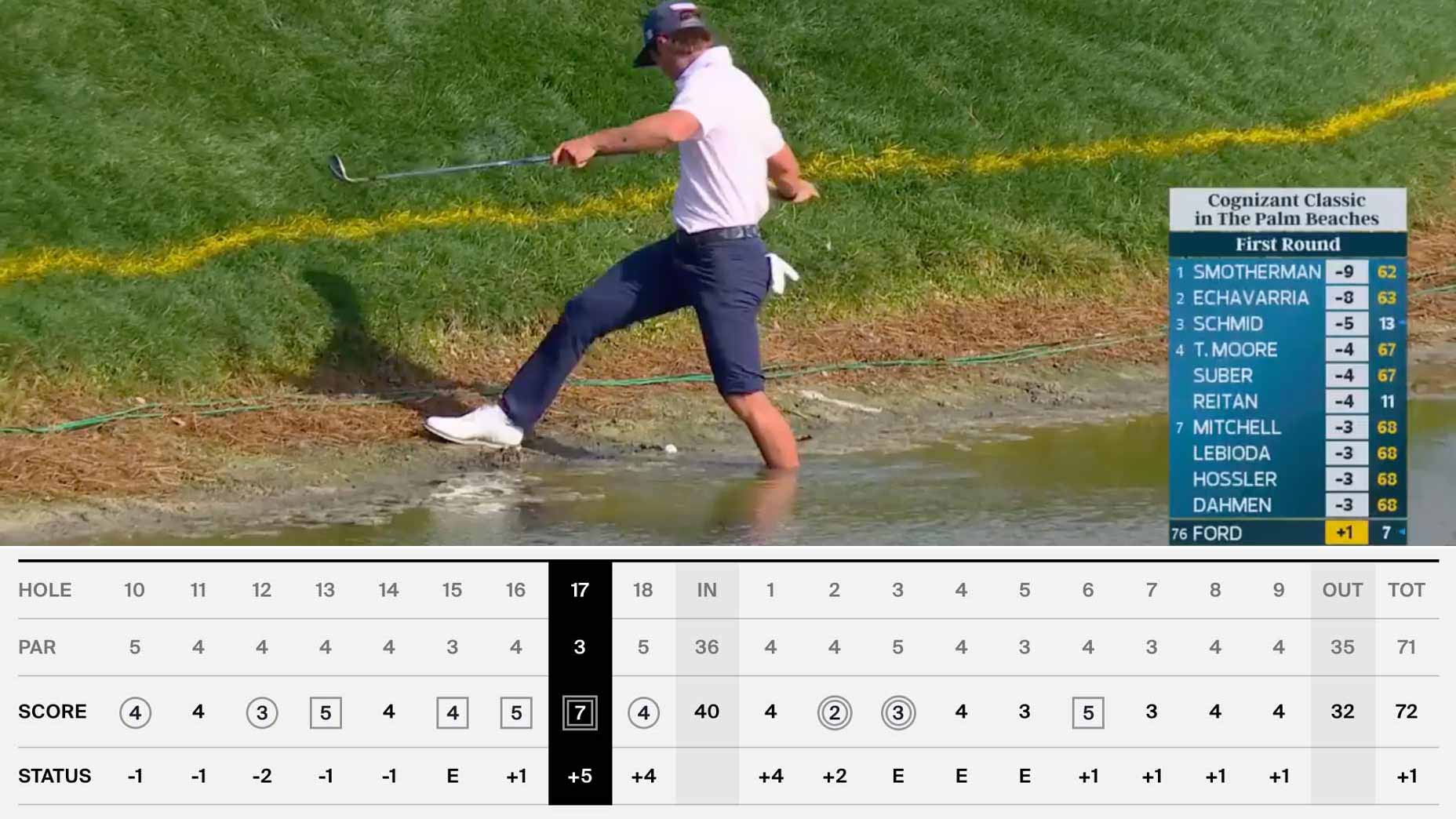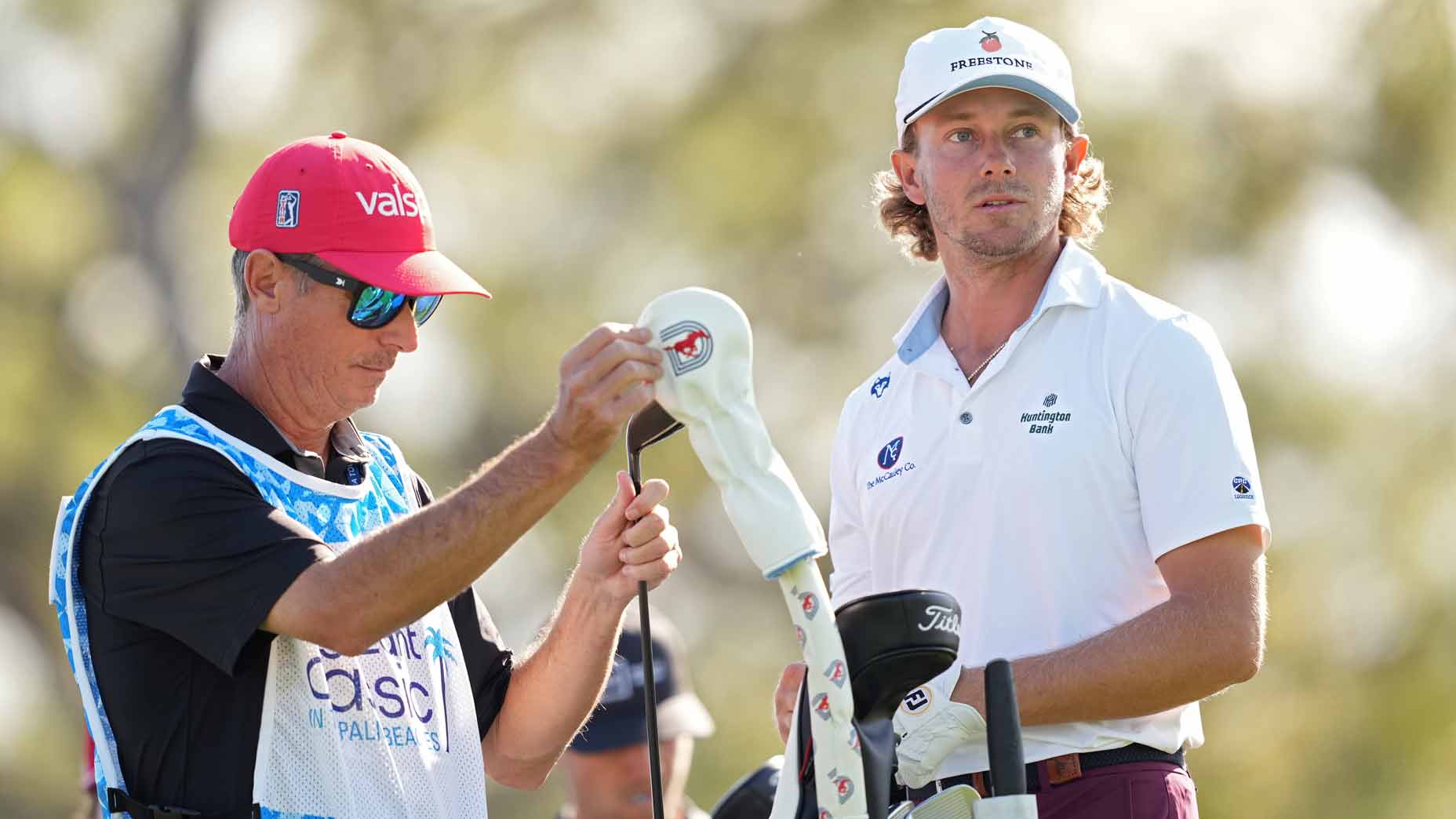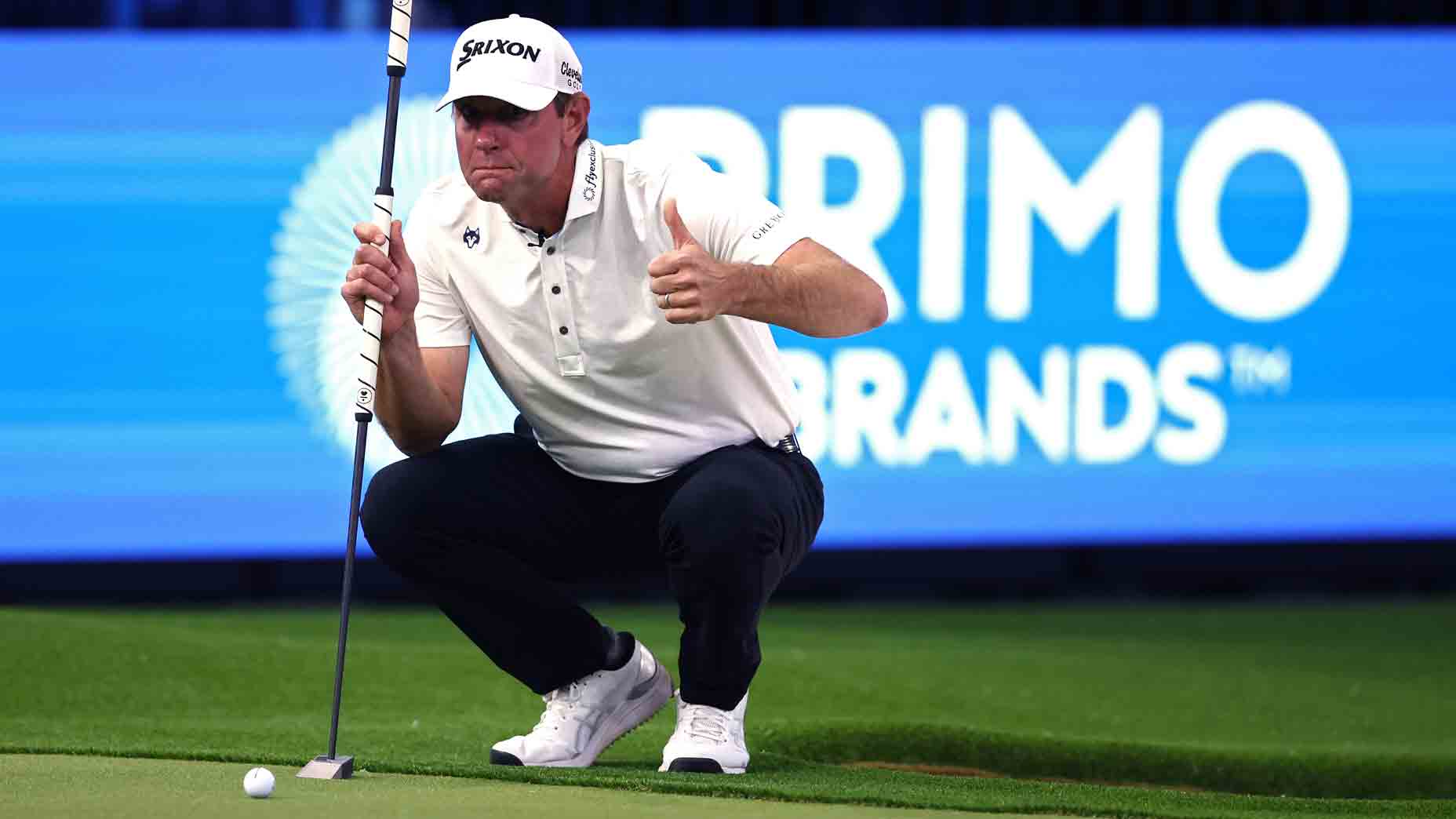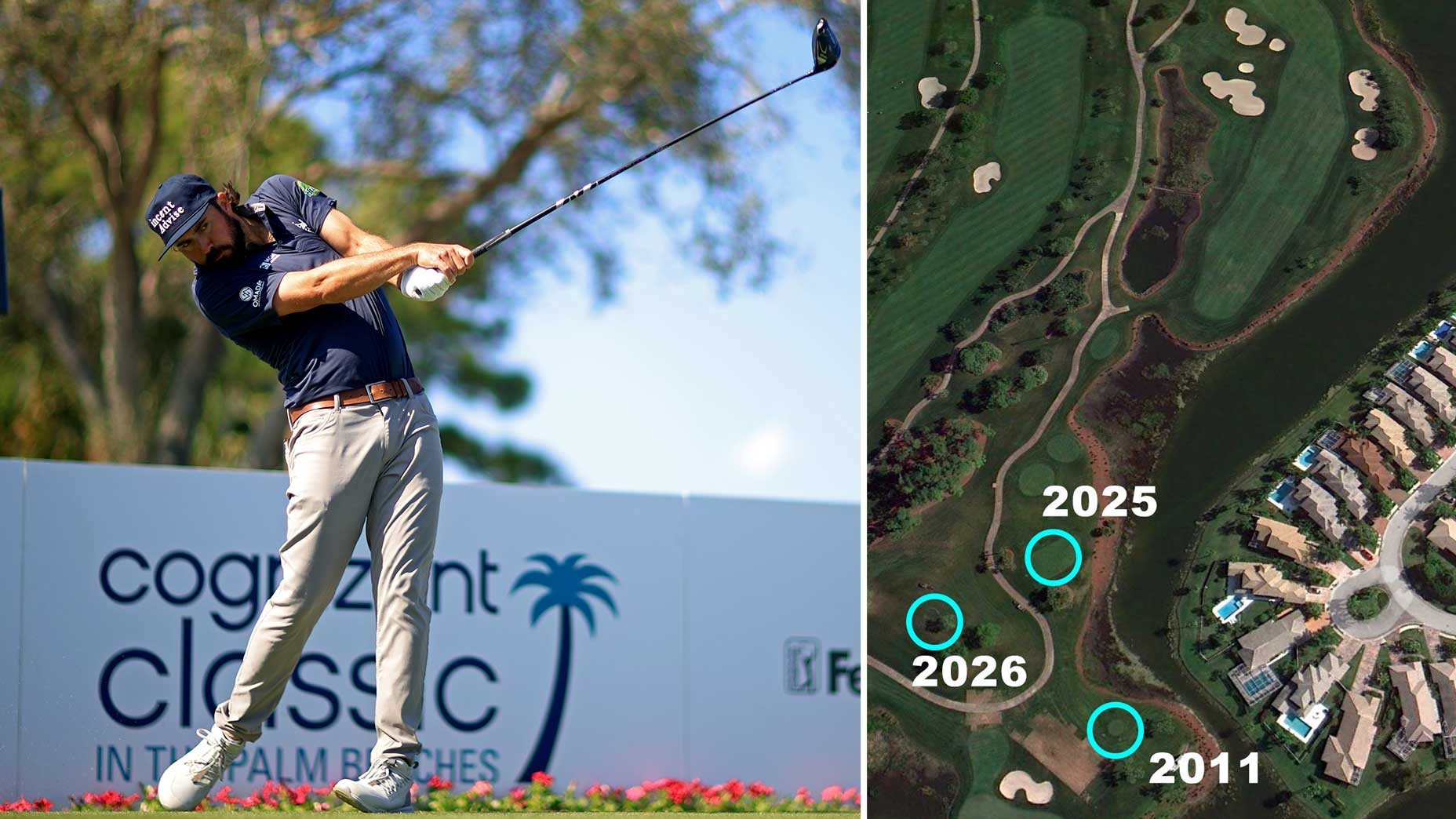The greatest match that never was almost took place on July 3 in Las Vegas, a prime-time TV special that was to have pitted Tiger Woods against Phil Mickelson in a $10 million winner-take-all, 18-hole death match. The negotiations, involving a major television network and various corporate entities, couldn’t quite be consummated in time but Woods and Mickelson and their people remain committed to making it happen as soon as it’s feasible. “We’re working on a different date,” Mickelson said on Thursday. “I thought it was done for the 3rd but obviously it wasn’t.” Woods’s representatives declined to comment.
The seeds were planted back in April, at the Masters, when Tiger and Phil played a much-ballyhooed practice round together. Mickelson has a history of using press conferences to further his business interests, such as at the 2010 Players when he repeatedly raved about Five Guys hamburgers only to have it revealed the following week that he had purchased Southern California franchise rights to the burger chain.
At this year’s Players, a month after the Masters, Wood and Mickelson were paired together and Phil said, “The excitement that’s been going on around here, it gets me thinking: Why don’t we just bypass all the ancillary stuff of a tournament and just go head-to-head and just have kind of a high-stakes, winner-take-all match. Now, I don’t know if he wants a piece of me, but I just think it would be something that would be really fun for us to do, and I think there would be a lot of interest in it if we just went straight to the final round.”
By then negotiations were well under way for the match so Woods was happy to play along, saying, “I’m definitely not against that. We’ll play for whatever makes him uncomfortable.”
The desire to team up for giggle golf — however lucrative it may be — marks a dramatic evolution for golf’s most high-profile frenemies. At a long ago Masters, when Woods was an intriguing amateur prospect and Mickelson a hotshot young pro being billed as the Next Nicklaus, Tiger sneaked a reporter into the Crow’s Nest, the tiny dormitory perched atop the Augusta National clubhouse. Woods was monitoring the telecast when Mickelson flashed onto the screen. With his long, languid stroke, Phil charged a putt past the hole. As the ball trickled farther and farther away, Tiger offered only one word of commentary: “Roll.”

The antipathy began on the playing fields of junior golf. Woods and Mickelson grew up in Southern California suburbia, separated by 100 miles but linked by their generational talent — both were prodigies from the earliest age. Older by 5 1/2 years, Mickelson loomed over Woods’s early golf life. “Phil was an icon to us,” says Tiger’s junior golf buddy Chris Riley, who would also reach the PGA Tour. Woods’s father, Earl, receives most of the credit for his son’s competitive spirit but it was his mom, Tida, who sharpened his killer instinct. With her it was personal. Any player who was as accomplished as the young Tiger was considered not just a competitor but a threat. So as Woods chased Mickelson’s numerous junior records throughout the 1980s, he was imbued with a strong disdain for a flashy counterpart he barely knew.
This dynamic carried over to the PGA Tour. As Woods was reshaping the sport in his image he had little use for Mickelson. This played out in press conference jabs, a famously frosty pairing at the Ryder Cup and other slights large and small. When Tiger began headlining made-for-TV exhibitions around the turn of the century he tapped not his most talented and popular peer but lesser-lights David Duval, Sergio Garcia…and Karrie Webb? It wasn’t until year five that Mickelson became a part of the show, but his chemistry with Woods was so awkward it helped kill the entire “Battle At…” franchise.
So while the Tiger-Phil rivalry has been a lifetime in the making, the groundwork was first laid for their proposed $10 million match four years ago in a sterile press room in Scotland. In the charged moments following the United States’s loss at the 2014 Ryder Cup, Mickelson put his name on the line by calling out the mismanagement of U.S. captain Tom Watson and the bungling bureaucrats at the PGA of America who had enabled him. Woods didn’t play in that Ryder Cup but he readily signed on to the Ryder Cup Task Force, which was hastily assembled after Mickelson’s comments to reform the Americans’ culture of futility. Tiger and Phil were the dominant voices on the Task Force, and this meeting of the minds began a long-overdue détente between golf’s biggest stars.
In early 2015, when Woods was suffering through the chip-yips, Mickelson reached out and offered to help him. Given their previous frostiness, it was a gesture of deep empathy. Throughout 2016, Tiger and Phil maintained a steady correspondence while exchanging ideas about that year’s Ryder Cup, where Woods would serve as a vice captain and Mickelson the team leader. That week at Hazeltine, Phil knew his reputation was at stake, and he was deeply moved by Tiger’s activist support.
“He was big a part of everything,” Mickelson said in a recent sit-down interview for a cover story in the August edition of GOLF. “He’s been a great vice captain because he’s so detail-oriented. Guys listen to him and respect him. They look at him with awe and admiration. When he says something, it’s taken very seriously. And so having his input and his voice be heard more was a big deal for us [in 2016] and continues to be.”
The friendship continues to blossom. At this year’s WGC-Mexico City, where Mickelson spent the entire week around the top of the leaderboard, Woods texted him encouragement every night and heartfelt congratulations after the victory. Of course, their correspondence is not always so syrupy. In private, both Mickelson and Woods are preeminent trash talkers, though Phil has often found himself stymied.
“The tough thing is that he has the trump card: his career record. OK?” Mickelson says. “Whether it’s 14 majors, 79 wins, however many players of the year awards, FedEx Cups, the whole deal. He owns all the trump cards. So I have to be very careful and strategic in my smack talk, because if I lay something down, in comes a trump card, you know, and then shuts me right up.”
This dynamic is one of the selling points to their made-for-TV match. Both players are on board with wearing microphones, and Mickelson allows, “You will hear a lot of the comments that you don’t hear on regular TV. We both like to talk smack, and we both have fun with what we’re doing. And the fact that this isn’t an official tournament, that it’s just a head-to-head match, you’ll hear some of the little nuances, some of the little things that you don’t normally pick up.”
Given that both are sitting on fortunes in the mid- to high-nine figures, is $10 million really that big of a deal? “It’s a ridiculous amount of money,” Mickelson says. “No matter how much money you have, this amount will take both of us out of our comfort zone.”
Woods and Mickelson are both showmen and salesmen, so it was only natural that they would look for an opportunity to leverage their starpower together. But Mickelson sees a potential match as a celebration of their friendship rather than a mere money grab, saying, “As we’ve developed a good relationship, we’ve started to collaborate on some other things that have allowed us to achieve things that we couldn’t do on our own. Like this match. I couldn’t do it on my own. He couldn’t do it on his own. But together, we’re [trying] to create something pretty special.”
An initial match in Las Vegas — Shadow Creek is the likely venue — is just the beginning of their shared vision. Mickelson says he and Woods hope to play a couple exhibitions a year, around the world. Sometimes they could partner up — depending on how the Ryder Cup goes, it’s easy to envision Tiger and Phil taking on two top Europeans (a match with Rory McIlroy and Ian Poulter as the opposition could be particularly juicy). Woods and Mickelson are both shrewd businessmen, and they are trying to set up this new venture so they essentially own the matches and thus will get a chunk of the TV revenue, merchandising, and sponsorship dough.
This is all of a piece with golf’s most famous friendship. Jack Nicklaus and Arnold Palmer began as bitter rivals but quickly learned to get along because it was better for business; their global barnstorming together helped both of them build empires. And over the years a deep affection grew. Similarly, Tiger and Phil have so much in common. Only they can relate to the intense pressure and scrutiny each has faced throughout a legendary career in the modern media age. When you think about it, it never made sense for Tiger and Phil not to be friends. Mention this to Mickelson and he says, “You’re 100 percent right, and we’re realizing that.”
Why did it take so long?
“I don’t know,” Phil said, “but we’ve turned the corner.”





